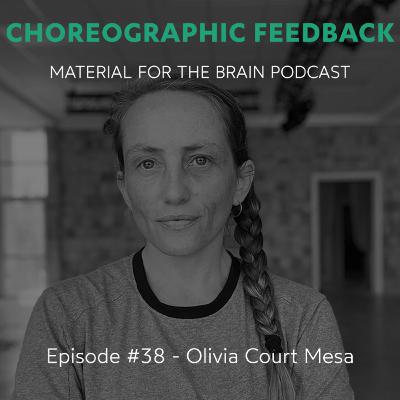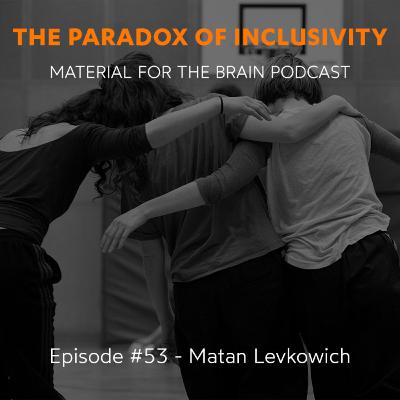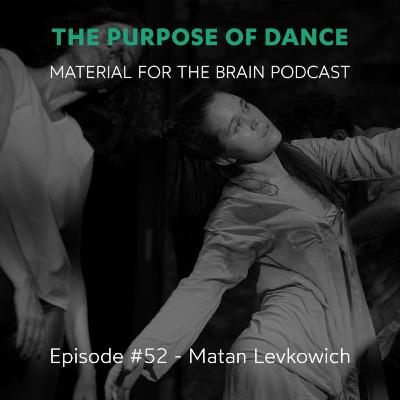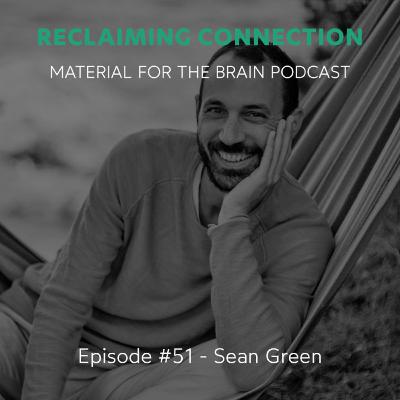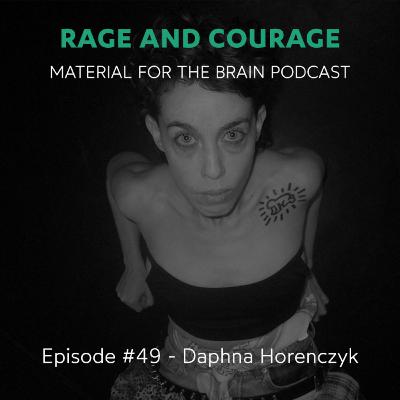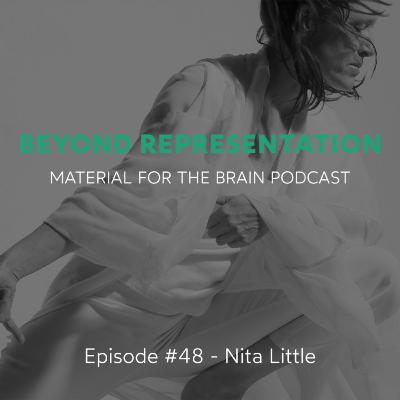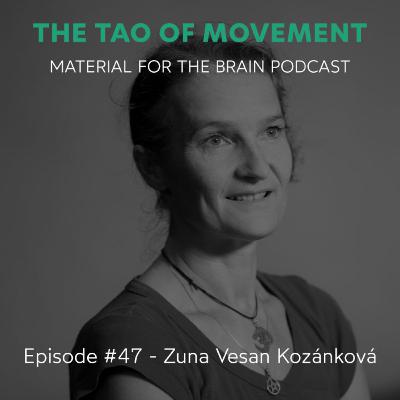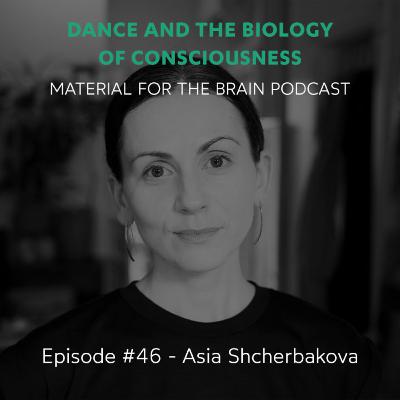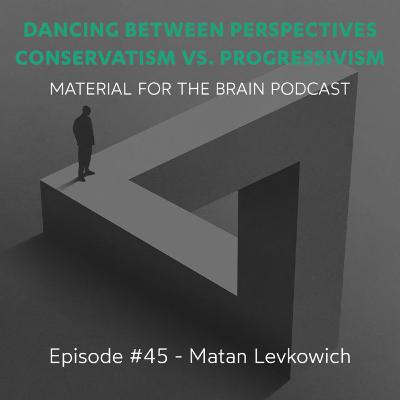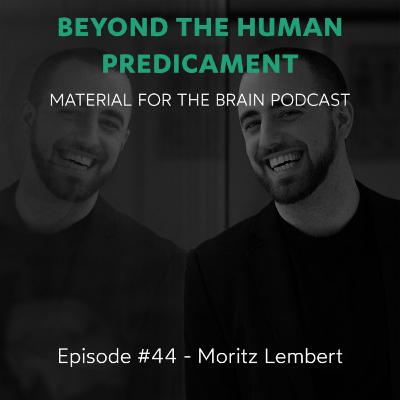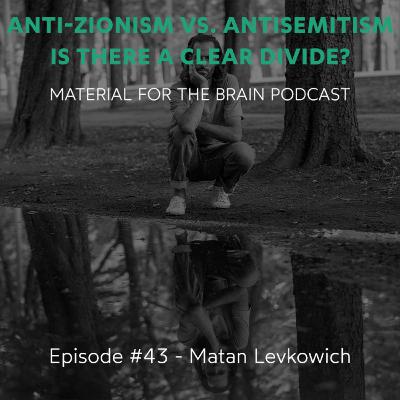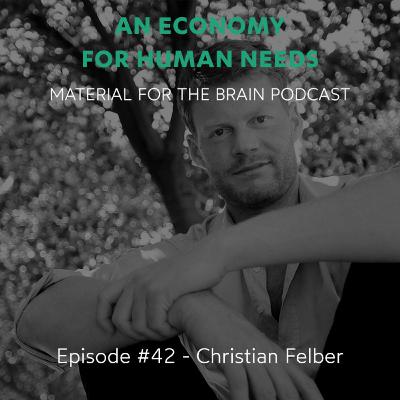Discover Material for the brain
Material for the brain

Material for the brain
Author: Matan Levkowich
Subscribed: 10Played: 145Subscribe
Share
© Matan Levkowich
Description
In 'Material for the brain', Matan Levkowich invites guest, colleagues and friends to reflect on the question 'How can one develop a meaningful relationship with one's own body'.
In his non formal style of hosting, Matan enables the conversations flow naturally between theoretic concepts, applicable ideas and personal stories.
Subscribe to get the podcast directly to your email:
https://movementlab.eu/subscribe
Learn more about the Movement Lab educational programs:
https://movementlab.eu/study-groups
In his non formal style of hosting, Matan enables the conversations flow naturally between theoretic concepts, applicable ideas and personal stories.
Subscribe to get the podcast directly to your email:
https://movementlab.eu/subscribe
Learn more about the Movement Lab educational programs:
https://movementlab.eu/study-groups
54 Episodes
Reverse
My guest for the 39th episode is Eran Dorfman. He is a professor at the Department of Literature, Tel Aviv University, and a former Directeur of the program at the Collège International de Philosophie, Paris. He specializes in 20th century French Theory and Literature, Continental philosophy, phenomenology and psychoanalysis. He is the author of several books of which the latest is Double Trouble: The Doppelgänger from Romanticism to Postmodernism.
I met Eran in Freiburg contact festival. We found ourselves delving into a long conversation about body philosophy politics and more. We were both intrigue about our parallels - him being a professor for philosophy who is interested in dance, me being a dancer who is interested in philosophy. I knew right away that I would invite him to the podcast to continue our conversation in this public format.
In our conversation we have talked about the potential meanings behind the phrase ‘being connected', we talked about the body mind split, about the biological reality of the body and its implications, about the tension between the universal and the particular, we talked about how to deal with dichotomies in thinking and much more.
Connect to Eran:
https://telaviv.academia.edu/EranDorfman
https://www.facebook.com/eran.dorfman1
Subscribe to get the podcast to your email:
https://movementlab.eu/subscribe
15% Discount Coupon for our online courses: MATERIALFORTHEBRAIN15%
https://movementlab.eu/courses
Join our info evening:
https://movementlab.eu/learn-more
My guest for the 38th episode is Olivia Court Mesa, a Chilean-Israeli independent dance artist. In the last 30 year She has devoted herself to performance art, performing, choreographing, improvising, researching and teaching. Olivia promote the idea that performance is a conscious meeting point between art and people and aims to use this medium as a space for individual and collective reflection.
In our conversation we dived into her universe, starting from the meta question of why she is engaged in choreography, into the different strategies she applies in the studio. We talked about her artist search for universality and the limitations on this quest. We talked different ways of relating emotionally to the body, we talked about the search of freedom within the confinement’s of the body and we talked about the role of artists when confronting the catastrophe of existence.
Connect to Olivia:
https://oliviacourtmesa.com
Subscribe to get the podcast to your email:
https://movementlab.eu/subscribe
15% Discount Coupon for our online courses:
MATERIALFORTHEBRAIN15%
https://movementlab.eu/courses
This episode was recorded on May 4th, 2025. My guest for this episode Christos Galanis - an interdisciplinary artist, cultural geographer, Animist, and ritual facilitator based in Santa Fe, New Mexico. His work intricately weaves themes of displacement, ancestry, and the sacred, drawing from a rich tapestry of personal history, ethnography, and experiential practices.Christos earned a BFA in Integrated Music Studies from Concordia University in Montreal, an MFA in Art & Ecology from the University of New Mexico and a PhD in Cultural Geography at the University of Edinburgh.Christos is the fourth generation of men in his family to emigrate from their country of birth, a lineage that profoundly influences his exploration of themes like displacement and belonging.In our conversation, we explored the meaning of animism as a lived framework rather than a nostalgic return to ancient belief. We talked about how Christos’ identity as a first-generation Greek-American informs his relationship to place, ancestry, and belonging. We talked about the philosophical shift from relational to categorical thinking found in modernity, that prioritized measurement over meaning. We discussed how indigenous animist perspectives challenge the foundations of modern science, especially around knowledge, truth, and verification.We talked about the legacy of monotheism, the ideological drive for universality, and how Judaism stands apart as a practice-based tradition still deeply rooted in place. We talked about the entanglement of place, ritual, and identity, and how the loss of locality contributes to existential disconnection.We talked about political animism as a potential alternative to left-right paradigms, about grief as a doorway to transformation, and about the struggle to live ethically in a world built on disconnection.
In this solo episode, Matan Levkowich explores the complex terrain of inclusivity in dance and movement spaces. Reflecting on personal experiences and recent conversations at a contact improvisation festival, he distinguishes between participatory and missionary forms of inclusivity, and unpacks the paradoxes that arise when openness becomes an obligation. A thoughtful inquiry into boundaries, values, and what it truly means to create a welcoming space.Join our Open Day:https://movementlab.eu/open-dayGet your ticket for our Performance Evening:https://movementlab.eu/performance-evening
In this solo episode, I explore a question that has been with me for years: Why do humans dance? Beyond self-expression or personal growth, dance may hold something much deeper—something ancient. I dive into the idea of dance as a social technology, a form of collective sacrifice, and a gateway to the transcendent.Whether you're a dancer, a seeker, or simply curious—this episode is an invitation to reimagine what dance can mean.Join our Info Evening:https://movementlab.eu/info-eveningSupport the podcast:https://movementlab.eu/mftb-supportSubscribe to get the podcast to your email:https://movementlab.eu/subscribe15% Discount Coupon for our online courses: MATERIALFORTHEBRAIN15%https://movementlab.eu/courses
My guest for this episode is Sean Green - a couples and relationship coach, trainer of communication and meditation, a father of 3 children, and musician based in Vienna.Sean has spent thousands of hours meditating, practising and learning from many traditions and schools on the Inner Path for over 20 years. His professional engagements are characterised by his calmness, clarity and loving presence. He support his clients in experiencing authentic aliveness, connection and inner peace. In our conversation, we explored the nature of communication—not just as a tool for exchanging information, but as the foundation of human connection. We talked about how communication extends beyond words, manifesting in movement, presence, and the unspoken rhythms of relationships. We discussed the tension between individual autonomy and the need for deep connection, and how modern society, with its hyper-individualism and digital mediation, has reshaped the ways we relate to one another.We talked about the impact of systems—economic, cultural, and technological—on our ability to form meaningful relationships and maintain boundaries and reflected on the paradox of contemporary life—how we are more connected than ever on a global scale yet increasingly isolated in our day-to-day interactions. We talked about the growing tendency to outsource human needs—emotional, relational, and physical—to paid services rather than communal support. And through it all, we returned to the question: what does it mean to be truly present in relationship—with ourselves, with others, and with the structures that shape our lives?Connect with Sean:https://seangreen.at/https://www.facebook.com/ehrlichseanSupport the podcast:https://movementlab.eu/mftb-supportSubscribe to get the podcast to your email:https://movementlab.eu/subscribe15% Discount Coupon for our online courses: MATERIALFORTHEBRAIN15%https://movementlab.eu/courses
My guest for the 50th episode is Smadar Goshen, a choreographer, dancer, a certified Gaga teacher and a Gyrotonic & Gyrokinesis trainer and teacher’s trainer. Smadar completed her B.A in dance and M.A in choreography at the Jerusalem Academy for Music and Dance. Since 2011 her pieces are performed on various platforms worldwide. In the yearbook of magazine tanz 2023, She was honoured as one of the 10 promising choreographers & dance pioneers in Germany. Since 2024 she is supported by the state capital Stuttgart and the Landesverband Freie Tanz-und Theaterschaffende Baden-Wuerttemberg. In our conversation, we explored the tension between personal identity and artistic expression, the role of the body in processing memory and trauma, and the impact of grief on creativity. We talked about the ways in which the body carries memory and trauma and about how Smadar’s artistic practice engages with personal and historical narratives. We talked about the role of dance as a channel for transformation and about the difference between performing to be seen and performing as a medium for something larger. We talked about the instinct to resist being absorbed into a collective identity and about how that tension informs Smadar’s work. We talked about Jewish identity, the legacy of the Holocaust, and about how Smadar’s encounter with a memorial site deeply shifted her perspective. We talked about the war in Israel, about its impact on identity, and about the complex emotions of belonging to a national narrative. We talked about how the body knows things before the mind does and about the importance of listening to the body in times of transformation and much more.Connect with Smadar:Website - https://smadargoshen.com/Facebook - https://www.facebook.com/smadar.goshen/Instagram - https://www.instagram.com/smadar_goshen/Vimeo - https://vimeo.com/user14631161Support the podcast:https://movementlab.eu/mftb-supportSubscribe to get the podcast to your email:https://movementlab.eu/subscribe15% Discount Coupon for our online courses: MATERIALFORTHEBRAIN15%https://movementlab.eu/courses
My guest for this episode is Daphne Horenczyk - a choreographer, dancer, teacher and mentor. Daphna’s artist work is center around the exploration of the gap between experience and representation. Her work has been funded by the city of Vienna and coproduced by different dance houses in the city. I invited her to the podcast once more to explore her current creation ‘Rage’, in which Daphna examines how identity politics have shaped the art culture in ways that prevent artistic freedom and cultivates self censorship and fear. The conversation took us to different territories. We talked about Daphna’s personal experiences in the Vienna scene and the culture and implication of language policing in the arts. We explored the concept of bridging experience and representation in dance, how to move beyond being reduced to identity categories. We talked about the tension between professional integrity and systemic pressures, We explored the challenge of curation and the selection process that artists confront and more.Connect to Daphna:https://www.daphnahorenczyk.com/https://www.instagram.com/daphnahoren/Get tickets for 'Rage':https://ticketgretchen.com/events/wien/wien/wuk/daphna-horenczyk-rage-15338/Support the podcast:https://movementlab.eu/mftb-supportSubscribe to get the podcast to your email:https://movementlab.eu/subscribe15% Discount Coupon for our online courses: MATERIALFORTHEBRAIN15%https://movementlab.eu/courses
My guest for this episode is Nita Little - a dance researcher, theorist/artist, and one of the founding developers of Contact Improvisation (CI). Nita holds a PhD in Performance Studies with a focus on the articulation of presence and creative actions of attention.
Her life work is inclusive of mindbody training, performing, choreographing, researching and writing about the ethics, politics and entanglement of somatic relations.
I invited Nita to discuss the practice of choreography. During the conversation we ended up talking about many things: We talked about her current projects, including performances and teaching practices, we talked about The concept of emergence in choreography and its transformative potential, how to move beyond representation in dance, exploring choreography as an act of "doing" rather than "showing”.
We talked about The interplay between identity and dance, and the limitations of cultural constructs in artistic creation. We talked about Trance states and altered states of attention as tools for enhancing creativity in dance. We talked about Dance as a relational practice that fosters interconnectedness and dissolves boundaries between performers and audiences and the importance of dancers claiming their authority as creators and researchers and more.
Connect to Nita:
https://www.nitalittle.com/
Support the podcast:
https://movementlab.eu/mftb-support
Subscribe to get the podcast to your email:
https://movementlab.eu/subscribe
15% Discount Coupon for our online courses: MATERIALFORTHEBRAIN15%
https://movementlab.eu/courses
My guest for this episode is Zuna Vesan Kozánková, a dancer, choreographer and writer. Zune is a leading authority on traditional Chinese medicine in Slovakia and the Czech Republic.
Over the last 30 years, she has developed a unique approach to working with the human body, combining anatomical understanding with the energy systems flowing within it. Through her studies of Chinese medicine and Qigong, she seamlessly connects her extensive dance knowledge with the universal principles of Taoism. She is the author of several books, including her latest, The Tao of Movement: Chinese Medicine Principles for Movers.
I invited Zuna to the show to discuss her latest book, which encapsulates her life’s work on the applications of traditional Chinese medicine in dance and other movement-related professions.
In our conversation, we explored the Taoist perspective on health, the physical, energetic, and conscious bodies, the role of energy in movement, strategies for health prevention, the influence of nutrition and seasonal changes on wellbeing, reconnecting with nature’s cycles, changing mental habits, and more.
Connect to Zuna:
https://artyci.com/en/zuna/
Get 20% discount to buy her book:
The Tao of Movement -
https://uk.singingdragon.com/products/the-tao-of-movement
Coupon - MLTTOM20 (valid until 28.2.25)
Support the podcast:
https://movementlab.eu/mftb-support
Subscribe to get the podcast to your email:
https://movementlab.eu/subscribe
15% Discount Coupon for our online courses: MATERIALFORTHEBRAIN15%
https://movementlab.eu/courses
My guest for the 46th episode is Asia Shcherbakova, a scientist and movement educator. Asia holds a Master of Science in Human Genetics and a PhD in Biotechnology. She is also a co-developer of the Baseworks method, where her focus lies in understanding the brain areas involved in both movement and cognitive tasks.
In her second appearance on the podcast, we delved into the topic of dance and its potential impact on human consciousness. Our discussion explored the differences between the experiential insights from my own research, The Metaphysical Body, and Asia’s scientific perspectives.
This dynamic exchange aimed to deepen our understanding of the mysteries of human consciousness while refining the language necessary for its exploration and study.
Show notes:
Asia's article: https://baseworks.com/article/disembodied-by-dance-embodied-mind/
Metaphysical Body lecture: https://movementlab.eu/the-metaphysical-body
Connect with Asia:
https://baseworks.com
https://www.linkedin.com/in/ksenia-shcherbakova
Support the podcast:
https://movementlab.eu/mftb-support
Subscribe to get the podcast to your email:
https://movementlab.eu/subscribe
15% Discount Coupon for our online courses: MATERIALFORTHEBRAIN15%
https://movementlab.eu/courses
In this solo episode, I dive into the age-old question: what should evolve, and what deserves preservation?
Inspired by the recent U.S. election ,I explore the ongoing tension between conservatism and progressivism, examining each side’s core intuitions.
Through personal stories and broader insights, I aim to reveal how these opposing intuitions might complement each other, offering a path toward balance and synthesis in today’s divided landscape.
Graphics credit: fran_kie / Adobe Stock
Support the podcast:
https://movementlab.eu/mftb-support
Subscribe to get the podcast to your email:
https://movementlab.eu/subscribe
15% Discount Coupon for our online courses: MATERIALFORTHEBRAIN15%
https://movementlab.eu/courses
My guest for this episode is Moritz Lembert is a life/business/personal coach, dedicated to helping individuals unleash their potential and do it with peace. With background in dance and embodied practices, His work is grounded in practical wisdom and radical honesty, with a no-nonsense approach that catalyses profound personal and professional transformations. His coaching encompasses everything from personal development and spiritual growth to strategic business planning and team dynamics.
In our conversation we have talked about the transformative experience Moritz have had, his epiphany moment so to speak, and what are the precondition for such experience. We have talked about the relation between personal catastrophes and transformation, we talked about agency and the difference between self responsibility and good environment. We talked about the state enlightenment and its relation to everyday life. We talked about the fear of death and how it prevents us from obtaining our own potential and more.
Connect to Moritz:
https://www.moritzlembert.com/blog
https://www.instagram.com/moritz_lembert
Support the podcast:
https://movementlab.eu/mftb-support
Subscribe to get the podcast to your email:
https://movementlab.eu/subscribe
15% Discount Coupon for our online courses: MATERIALFORTHEBRAIN15%
https://movementlab.eu/courses
We are two weeks away from marking a year since the events of October 7th. It has been a challenging year for many Jews, Israelis, and Palestinians alike.
In this solo episode, I take the time to dissect a common argument that has become very prevalent in the dance world: "I’m not antisemitic, I’m only anti-Zionist."
As an Israeli Jew, I am very familiar with the different expressions of antisemitism and feel it is my duty to share and help others become more aware of its mutable nature and how it can seep into our minds in different disguises.
I hope you learn something and feel free to share your perspective or correct me on any errors you find in my views and arguments.
Support the podcast:
https://movementlab.eu/mftb-support
Subscribe to get the podcast to your email:
https://movementlab.eu/subscribe
My guest for the 42nd episode is Christian Felber, an internationally renowned speaker, contemporary dancer and author of several economics bestsellers.In our conversation we talked about his perspective about the boundaries of the term ‘economy’ and what we should consider under this term. We explore the boundaries of the term universal human needs and their relation to the current economical order and looked at at his alternative economical principles.
We talked about the connection between economy and the preservation of a culture, We talked about human behaviour and whether violence is a rooted in socialisation of nature. We talked about how to govern violence from an individual perspective calling up to relation between states. We addressed coordination problems and their challenges, we talked about discourse culture post covid and whether polarisation is on the rise and much more.
Connect to Christian:
Website: https://christian-felber.at/en/
Economy for the Common Good: https://www.ecogood.org/
Cooperative for the Common Good: https://www.gemeinwohl.coop/
Gemeinwohlkonto: https://www.gemeinwohlkonto.at/
Study Group Open Day
https://movementlab.eu/open-day
Subscribe to get the podcast to your email:
https://movementlab.eu/subscribe
15% Discount Coupon for our online courses: MATERIALFORTHEBRAIN15%
https://movementlab.eu/courses
In this solo episode, I address the topic of ‘Community’ within the Movement Lab context and beyond.
Join our Open Day:
https://movementlab.eu/open-day
Subscribe to get the podcast to your email:
https://movementlab.eu/subscribe
The podcast was recorded using riverside.fm - remote recording in studio quality:
http://www.riverside.fm?via=matan
My guest for the 40th episode is Ohad Interator, a certified Physical Therapist, an independent movement practitioner and explorer, dedicated to teaching, helping and empowering people to live more fully within their bodies. His interests are rooted in discovering and developing better models for movement, health and wellbeing, within a human centric, holistic approach.
Ohad has a diverse movement background, he is a graduate of philosophy studies from Tel Aviv university, and an eco therapist. He owns a clinic in Tel Aviv, and teaches classes, workshops and courses on a regular basis.
In our conversation we spoke about his childhood experience with bulling and how it informed his relation with his body and set him on a path of embodied explorations. We talked about his current perspective on health that spans over three major areas - relation with oneself, with others and with the environment. We talked about particularisation when working with people and how to align it with general principles and much more.
Connect with Ohad:
https://www.youtube.com/channel/UCV0lOdHM3COIJOnlL7zQFHg
https://www.instagram.com/ohadinte/
Subscribe to get the podcast to your email:
https://movementlab.eu/subscribe
15% Discount Coupon for our online courses: MATERIALFORTHEBRAIN15%
https://movementlab.eu/courses
Study Group application
https://movementlab.eu/apply-now
My guest for episode 37 is Johan Nilsson, an explorer of natural sciences and art. He’s a trained gardener and teacher in Biodynamic farming, gardening and Permaculture Design. He is a contact improvisation dancer and teacher. In his work Johan opens a space in which we can learn more about our own individual bodily system through the study of larger ecosystems, and cultivating our empathy for the larger systems based on your own somatic experiences.
Connect with Johan:
johantraggae@gmail.com
https://www.facebook.com/johan.nilsson.traggae
Subscribe to get the podcast to your email:
https://movementlab.eu/subscribe
In this conversation I am speaking with Shady Greis, a dance artist from Egypt. We have delve into our histories and personal experiences, growing in the middle east, in an attempt to shad light on the development of our perception of the 'other'.
This is another episode in the special series 'conversations in times of crisis'.
Connect to Shady:
https://www.facebook.com/4haDy.EmaD
Support Shady's crowd funding:
https://whydonate.com/de/fundraising/help-our-friend-shady
Subscribe to the Podcast:
https://movementlab.eu/subscribe
This is a special episode in what may become a series of conversations in which I invite anyone who is interested to join me in discussing the current state of affairs in the Israel-Hamas war.
I have taken the exceptional decision to open up my platform to content that has a direct bearing on politics. In the near future, I will return to publishing content that touches on the more typical areas I cover here.
Subscribe to get the podcast to your email:
https://movementlab.eu/subscribe



